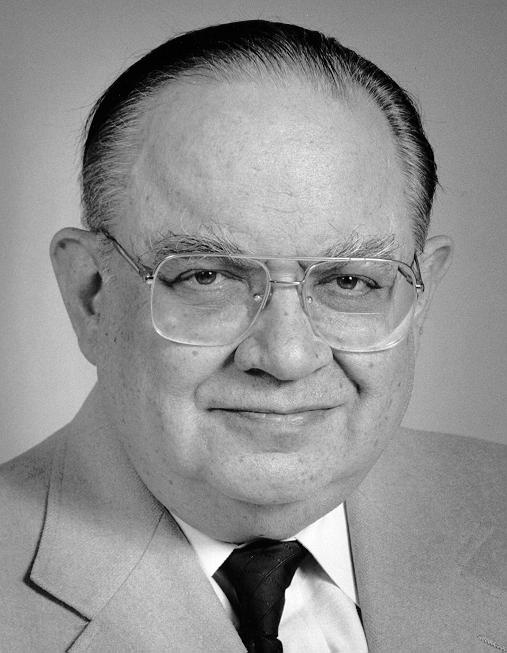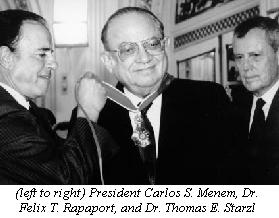

 |  |
RAPAPORT RECEIVES HIGH HONORS
Awarded the Transplantation Society's Medawar Prize,
Decorated with Argentina's Order of May
 On
July 15, 1998, Felix T. Rapaport, MD, SUNY distinguished professor
(surgery), was awarded the prestigious Medawar Prize—the
ultimate accolade of world transplantation—at the World Congress
of the Transplantation Society, held in Montreal, Canada.
On
July 15, 1998, Felix T. Rapaport, MD, SUNY distinguished professor
(surgery), was awarded the prestigious Medawar Prize—the
ultimate accolade of world transplantation—at the World Congress
of the Transplantation Society, held in Montreal, Canada.
The two other recipients of this year's Prize are Dr. Fritz Bach, the Lewis Thomas professor of medicine, and Dr. Anthony Monaco, the Peter Medawar professor of transplantation surgery, of Harvard University. The Prize itself includes a medal, plaque, and 100,000 Swiss francs.
In his introduction of Dr. Rapaport at the award ceremony, Dr. Thomas Starzl, past-president of the Transplantation Society, celebrated his colleague as a "peerless educator, scientist, and transplant surgeon." Highlighted were Dr. Rapaport's diverse scientific contributions over the past four decades that, according to Dr. Starzl, have had a "vast influence on transplantation," starting with his reports of the first systematic study of skin allograft rejection in humans which suggested the possible existence of tissue types.
This early work led to the discovery made by Dr. Rapaport, together with Dr. Jean Dausset, of the human leukocyte antigen (HLA) system of human histocompatibility, which laid the scientific foundation for organ transplantation.
Funded by Sandoz Pharmaceuticals, the Medawar Prize is awarded biennially to one or more persons for a major scientific discovery or a focused body of work in immunobiology or experimental/clinical transplantation. The Prize was established in 1988 in honor and memory of the Society's first president, Sir Peter Medawar (1915–1987), who is considered the founder of transplantation immunology.
Celebrated in Argentina
 On June 1, 1998, Dr. Rapaport was decorated personally by the
President of Argentina, Carlos S. Menem, with the Order of May at
the rank of commander. The Order of May, which is Argentina's
highest civil decoration, was bestowed upon Dr. Rapaport to
express the nation's permanent gratitude for his efforts to
advance organ transplantation in Argentina. The ceremony was
held in the Presidential Palace, in Buenos Aires.
On June 1, 1998, Dr. Rapaport was decorated personally by the
President of Argentina, Carlos S. Menem, with the Order of May at
the rank of commander. The Order of May, which is Argentina's
highest civil decoration, was bestowed upon Dr. Rapaport to
express the nation's permanent gratitude for his efforts to
advance organ transplantation in Argentina. The ceremony was
held in the Presidential Palace, in Buenos Aires.
Fellow transplant leader Dr. Thomas Starzl also received the Order of May, as part of Argentina's celebration of both physicians. Drs. Rapaport and Starzl are the first two physicians to ever receive this decoration in the history of the Order.
At the decoration ceremony, President Menem said, "Drs. Rapaport and Starzl are great medical figures whose achievements, which are as countless as their works, need no qualification. Both men have made an outstanding contribution to benefit our nation and the world at large. Their work transcends the self, and that is why they set a double example for the next generation of physicians and researchers."
The Order of May was established by Argentina in 1946. This decoration expresses the nation's gratitude to those who, through their efforts, have contributed uniquely to its progress, well- being, culture, and international solidarity and collaboration. It was originally named the Order of Merit. Its name was formally changed in 1957 to reaffirm the ideals of the leaders of the May Revolution (1810), which launched Argentina's long struggle for independence.
Argentina's celebration of Drs. Rapaport and Starzl coincided with a special two-day international festschrift in honor of both physicians, held on June 1–2 in Buenos Aires. The festschrift, titled "Present and Future Challenges in Transplantation," was attended by more than 400 participants. The 18 invited guest speakers represented the cutting edge of transplantation research worldwide.
| Back to Departmental News | Return to Home Page |